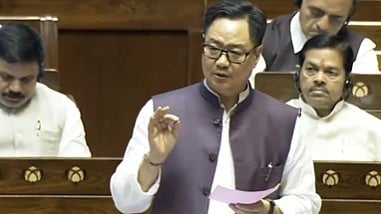Waqf Amendment Bill: Union Minister Kiren Rijiju Says ‘No Non-Muslim Can Interfere In Waqf Board’ | (Photo Courtesy: X/@ANI)
New Delhi: Union Minority Affairs Minister Kiren Rijiju on Thursday, April 3, dismissed the allegations that the Waqf (Amendment) Bill, would negatively impact the interests of the Muslim community. During his address in the Rajya Sabha, Rijiju defended the bill, asserting that it does not infringe upon the rights of Muslims, and reiterated that the management and beneficiaries of the Waqf Board will remain exclusively with Muslims.
Addressing concerns raised by the critics, Rijiju denied the claims that the bill was unconstitutional or that it would limit Muslim rights. “I categorically reject all these allegations. Any Muslim who wishes to manage their property through a trust can do so without restrictions,” he said.
He added that the Waqf Board’s role is akin to a Charity Commissioner, ensuring proper management of Waqf properties while enforcing accountability and transparency.
Have a look at his statement here:
A key provision of the bill, according to Rijiju, is the requirement for proof of ownership before a property can be declared Waqf. This would replace the previous provision where any claim by the Waqf Board automatically led to the property being designated as Waqf. Rijiju stressed that this change would streamline the process and prevent misuse.
The minister further outlined the extensive deliberations that led to the bill’s introduction. He revealed that over one crore memoranda and suggestions were received from the public, and a Parliamentary Committee held consultations across 10 cities, including Mumbai, Kolkata, and Bengaluru.
Rijiju also traced the history of Waqf Board reforms, citing earlier reports such as the 1976 Congress-led government’s inquiry commission and the 2006 Sachar Committee Report, which recommended strengthening and digitising the Waqf Board. Despite recommendations to improve the management of Waqf properties, Rijiju pointed out that previous governments, particularly the Congress-led UPA, had failed to act. “These committees were set up during Congress and UPA rule, yet they failed to act. The Narendra Modi government is fulfilling these recommendations that the Congress did not dare to implement,” he said.
Rijiju concluded by saying that the bill is designed to improve the efficiency and accountability of Waqf property management, while safeguarding the autonomy and rights of the Muslim community.
